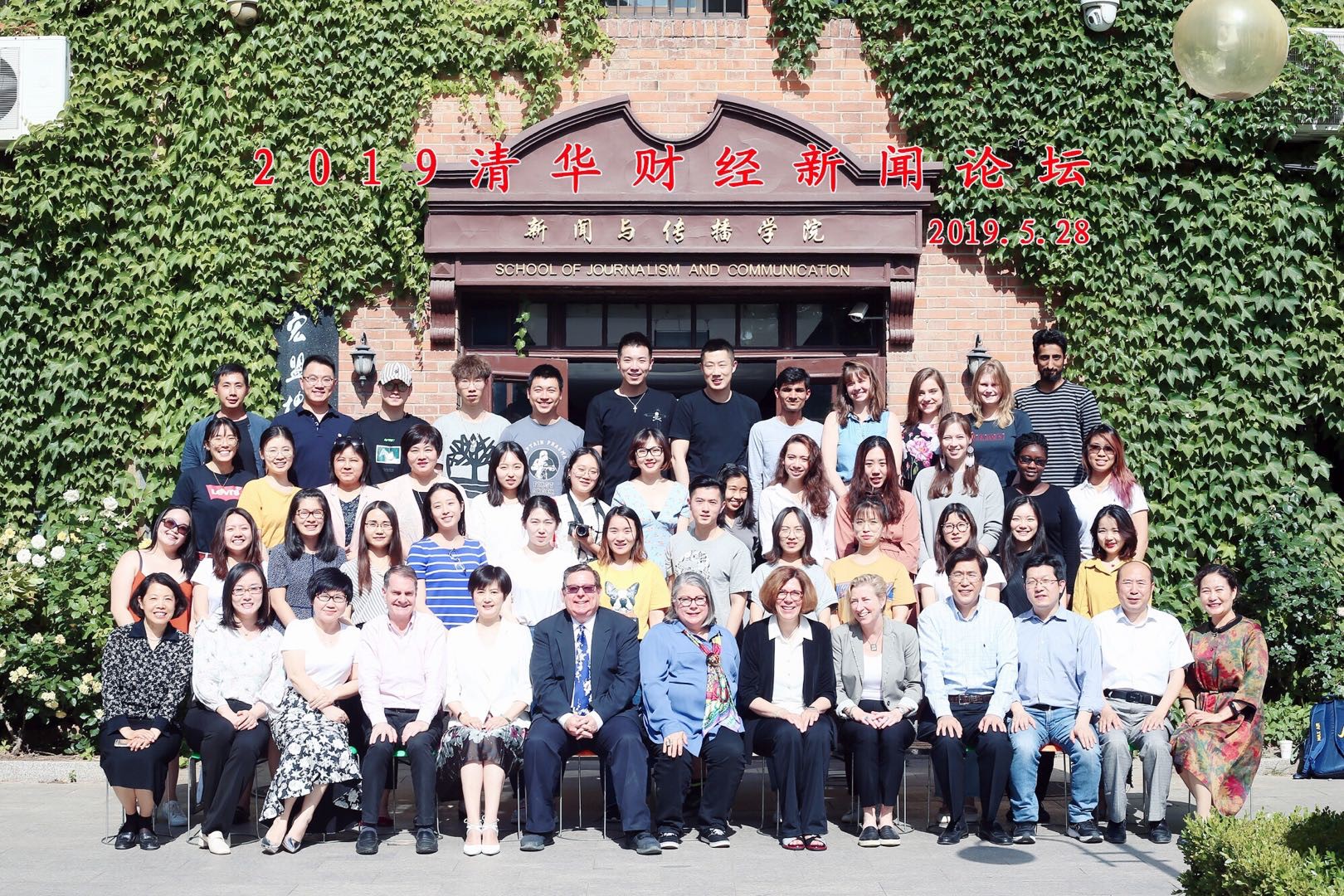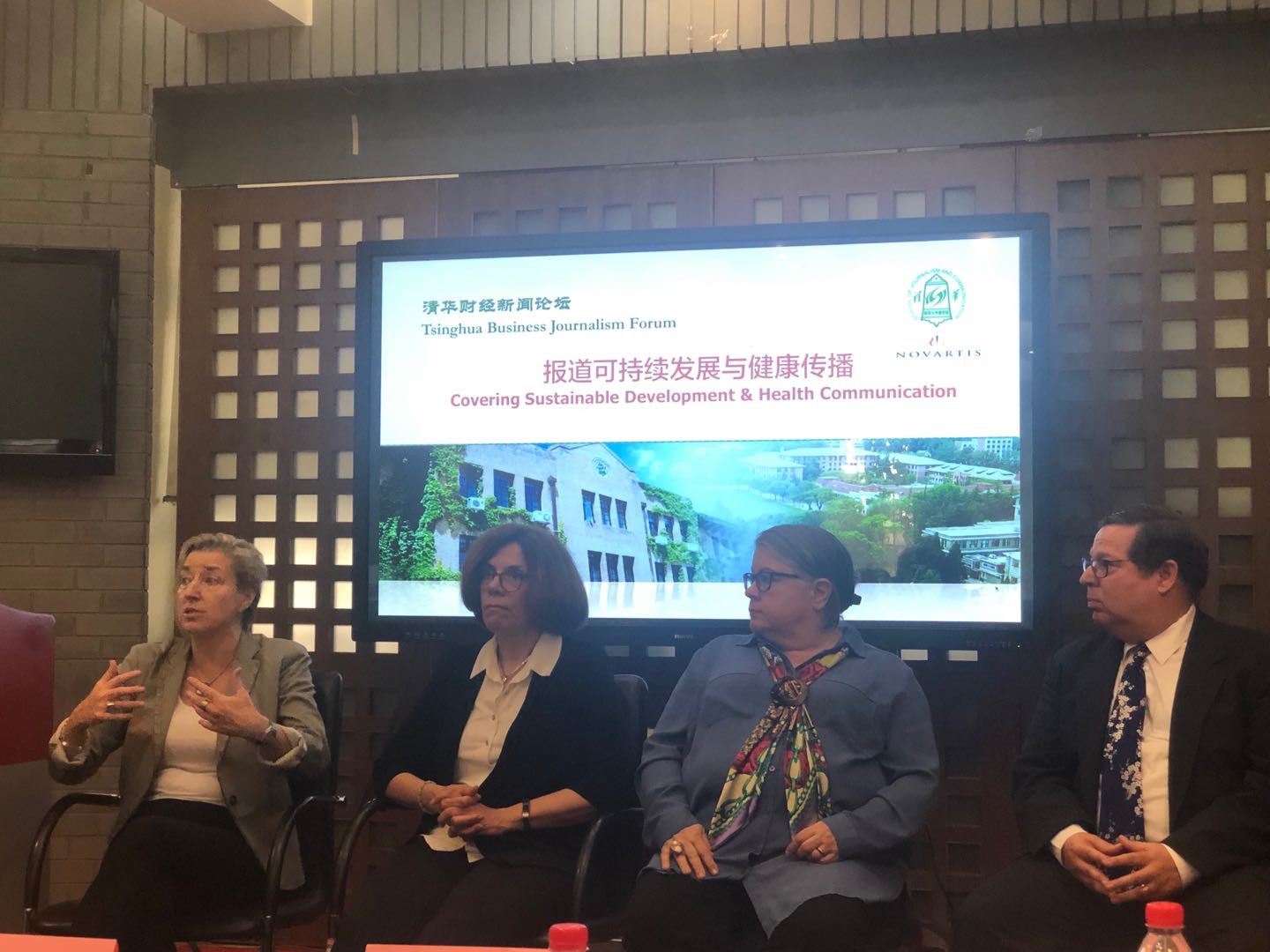"Covering Sustainable Development and Health Communication" was the theme of the annual Tsinghua Business Journalism Forum on May 28.
The event, hosted by Tsinghua School of Journalism and Communication and the Global Business Journalism Program, featured journalists from China and around the world, policy experts and scholars from Chinese universities.
Hang Min, associate dean of the Tsinghua School of Journalism and Communication and co-director of the Global Business Journalism Program, told the audiencein TSJC’s Global Sources Room that sustainable development and health communication are frontier topicsof significance both in public policy and journalism.
In 2015, the United Nations published the 2030 Agenda for Sustainable Development and proposed 17 sustainable development goals in it, which take into account social, economic and environmental factors. Health communication can help individuals make correct decisions and improve the health level of the whole society. This forum has collaborated with Novartis Group (China) to explore the meaning of global issues in the Chinese context, as well as the difficulties and opportunities faced by the news media in covering sustainable development and health communication issues.
Marilyn Geewax, a veteran journalist with a decade of experience at U.S. National Public Radio and visiting scholar in the Global Business Journalism Program, introduced that background of sustainable development in an era of rapidly increasing globalization. Political, economic and social problems are becoming more and more complex in today’s interconnected world, while the number of news organizations and journalists are shrinking, she said. These shifts require journalists to be able to break down big issues to tell stories which are more closely linked with the readers and are more attractive. As the UN sustainable development goals move forward, changes on issues ranging from gender equality to marine ecology deserve attention, and journalists should point out the problems and address solutions, she said.
Rick Dunham, co-director of the Global Business Journalism Program, suggested reporting strategies to better cover sustainable development issues. Citing best practices from around the world, he said journalists should be more creative and analytical in thinking about sustainable development topics. One effective way to cover the issue is to localize the impact of global topics, including background explanations, analysis of causation, data comparisons, and descriptions of possible solutions.
Jane Sasseen, executive director of McGraw Center for Business Journalism at the Newmark Graduate School of Journalism of the City University of New York,described efforts in the United States to focus greater media attention on important issues such as climate change. She noted that much of American journalism is motivated by audience size and economic profitability, resulting inmore of a focus on celebrity news and sensationalism. She described the initiative launched by Columbia Journalism Review and the magazine The Nationto look for stories which are important to the daily lives of readers, and to choose the best narration and reporting tools.
Lee Miller, Editor at Large at Bloomberg News and a visiting professor at the Global Business Journalism Program presented data and research on health communication conducted via the Bloomberg terminal. These stories illustrated the significance of these data with vivid and detailed case studies. He talked about how news can make change happen and make the world a better place.
"A news report is like a stone thrown into a lake,” Professor Miller said. “It can make ripples. It can make waves. And health coverage is an important part of that.”
Pam Tobey, visuals editor of Beijing Review, talked about ways to harness digital technology and data visualization in reporting on sustainable development and health communication. She presented visual reports on topics such as global warming, marine debris and health communication, as well as data sources, analytical tools and charting tools, and offeredoperational suggestions for creating effective and informative data visualization. Aneffective use of data can better inform readers of news facts they do not know yet, she said.
After the keynote speech part, the speakers conducted a roundtable discussion on the challenges of sustainable development and health communication, and conducted in-depth interactive conversations with the audience.
The forum featured experts from The Economic Observer, Caixin Media, Central University of Finance and Economics, Communication University of China, University of International Business and Economics, Central Academy of Fine Arts, Beijing Technology and Business University, Zhengzhou University, Chunyuyisheng and other organizations.
The forum also celebrated the release ofTsinghua Business News Forum, a book compiled by twelve academic and industry experts including Hang Min, based on "Tsinghua-Novartis Group (China) Business News Series Courses." This book, a tool for business news reports and health communication projects, not only contains unique insights on business and health reporting from professional media reporters and university scholars, but also shares practical experience gained by practitioners of medical and health enterprises after years of work.
Through the communication of information and opinions among media, universities and enterprises, future communication talents can learn practical knowledge, Professor Hang said. The integration of academic circles and industry experts can also be play a positive role in the communication of medical and health industry in the future, she added.
Tsinghua University in 2007 launched the Global Business Journalism Program (GBJ), which is currently the only English language business news program onthe mainland of China. The program’s alumni include more than 160 international students from over 60 countries and more than 200 Chinese students. These graduates have created a large pool of professional business news journalists with international vision and a detailed knowledge of China.
Previous Tsinghua Business Journalism Forum topics include"data news in business reports,"“China’s economicreports under the ‘new normal’,”and "economic reports and communication in the era of cyberspace.” The annual event has provided broad and deep guidance for the practice of business news reporting and has effectively improved the internationalization and specialization of news education at Tsinghua University.



